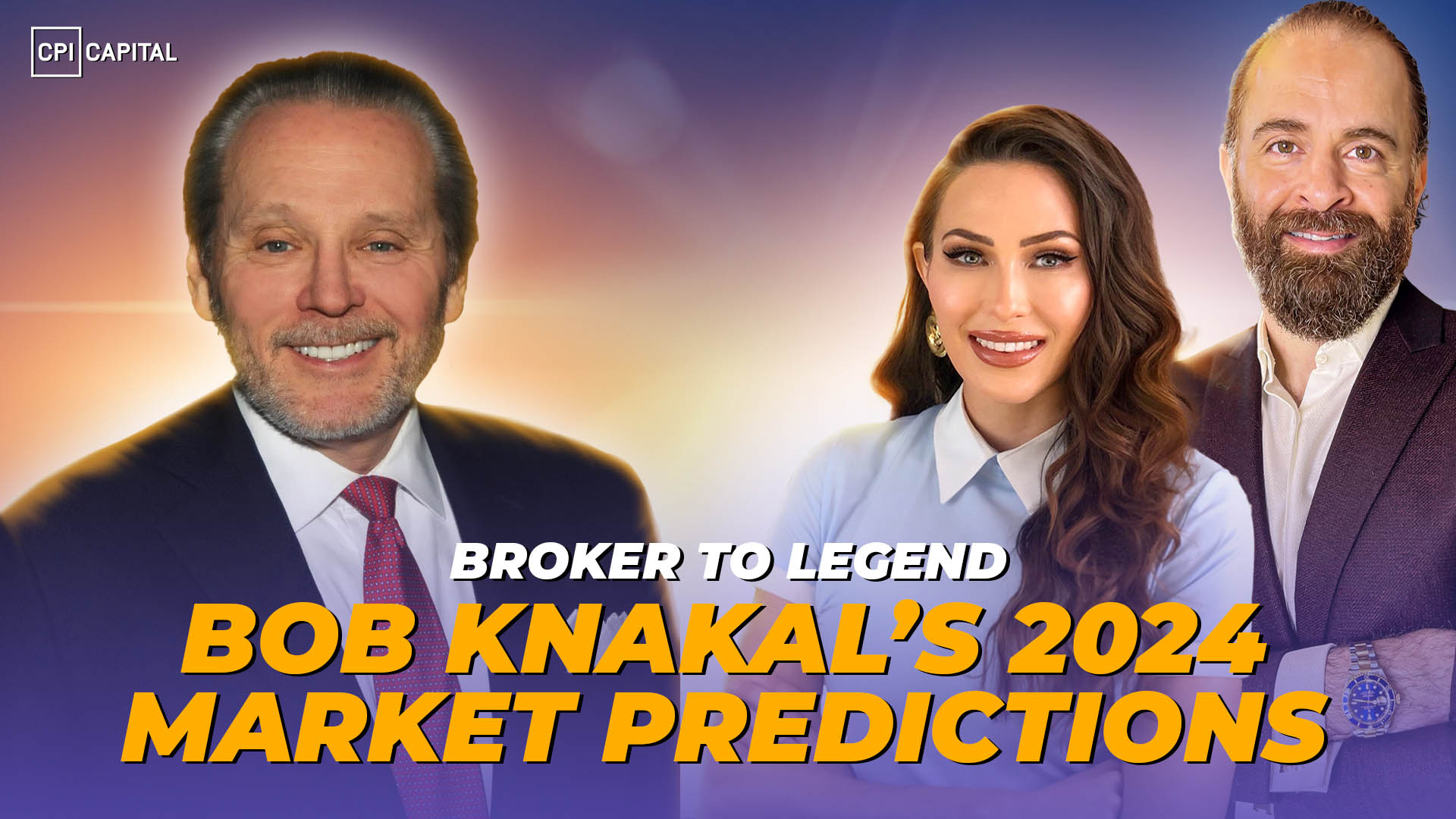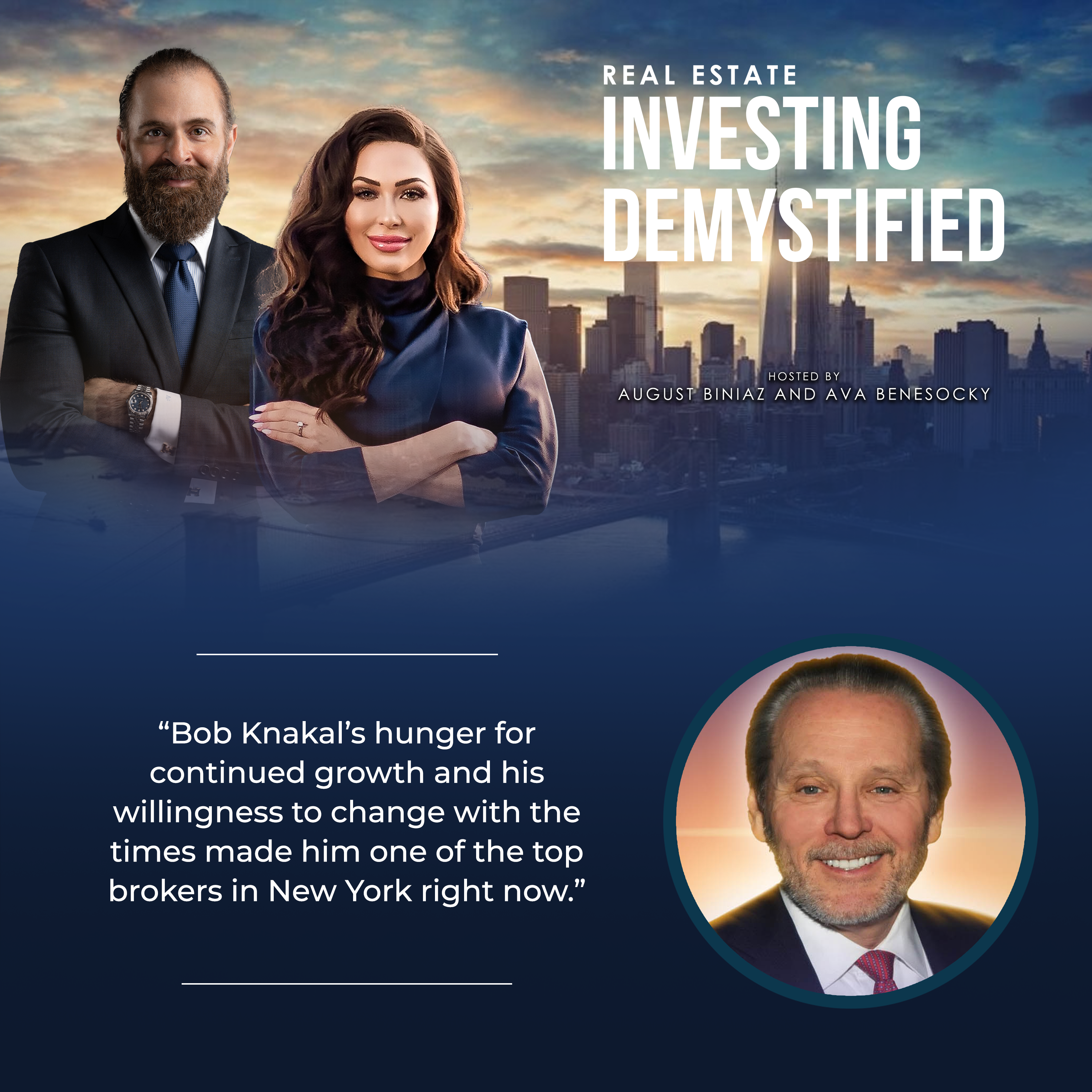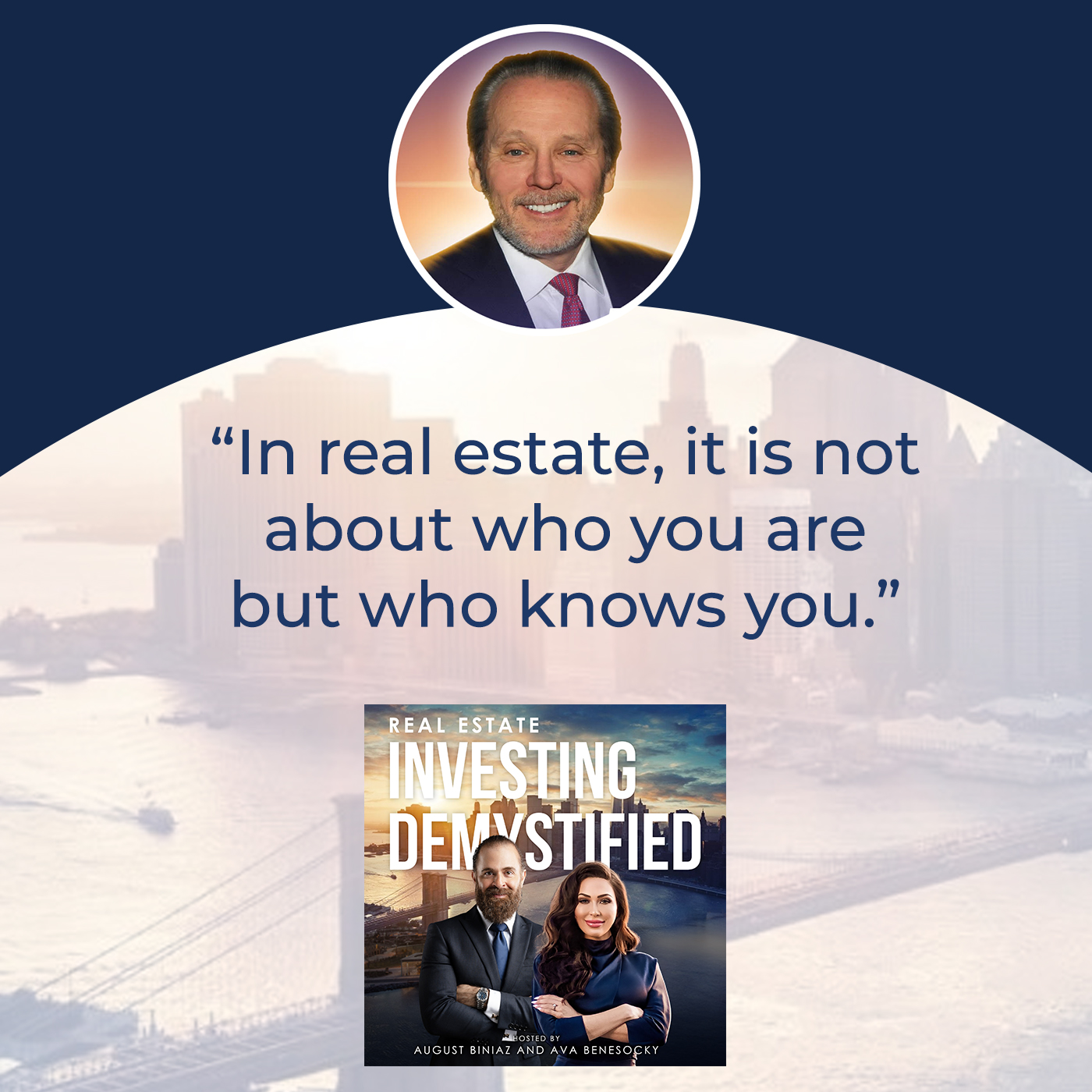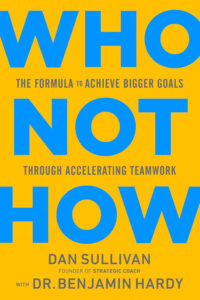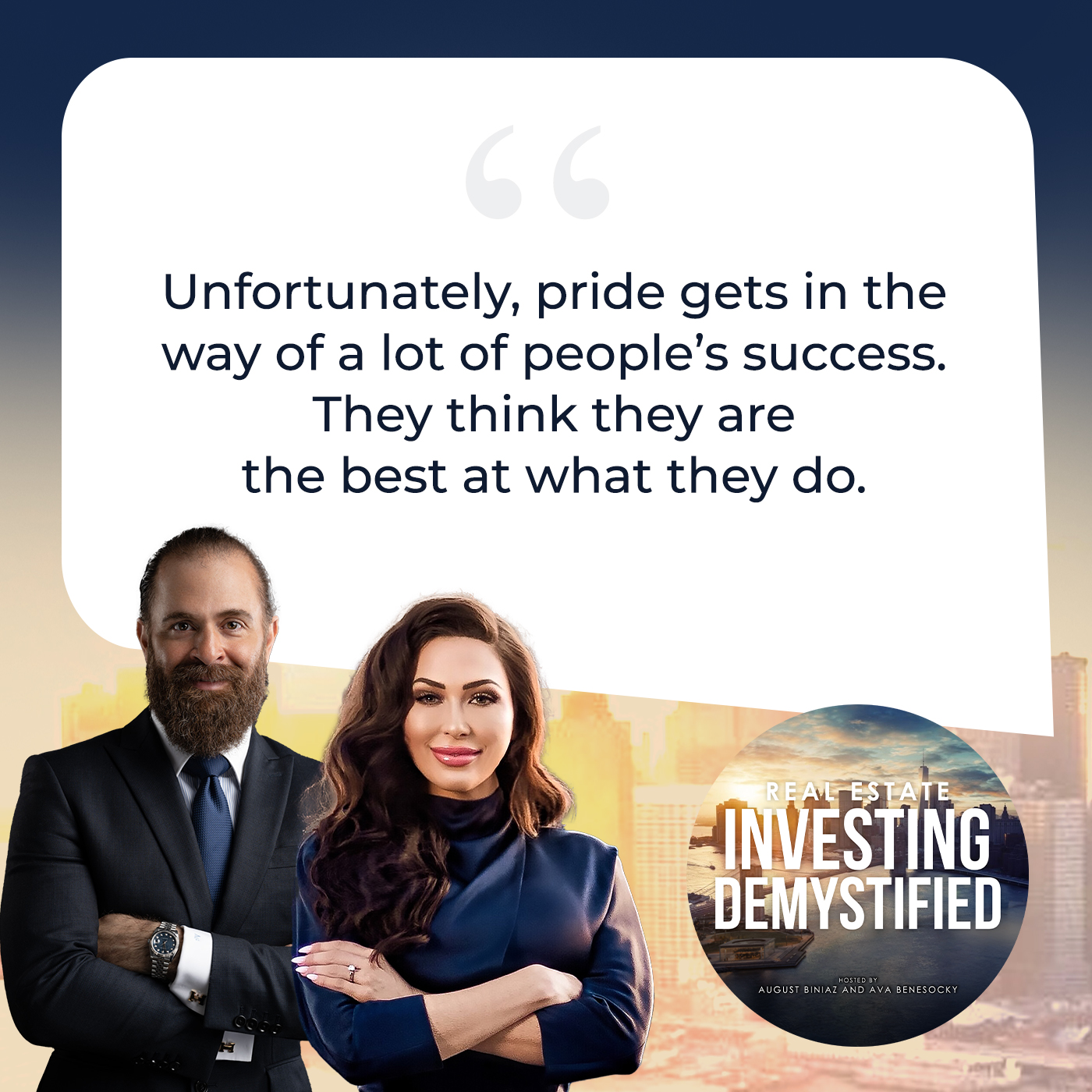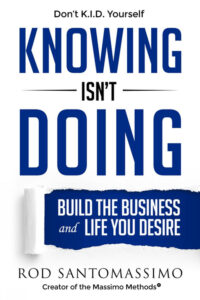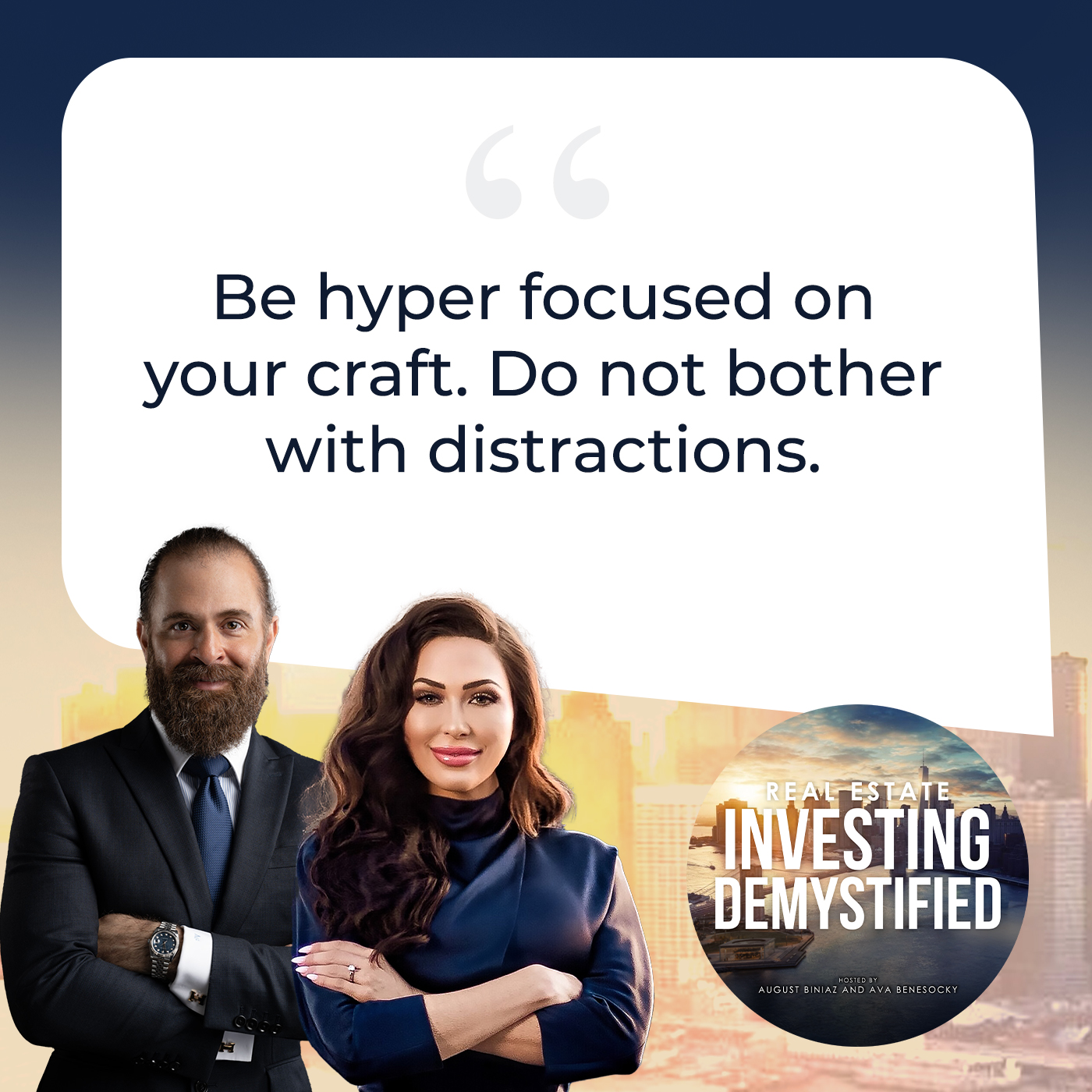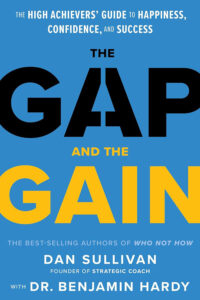Ava Benesocky and August Biniaz sit down with Bob Knakal, a top commercial broker in New York City, who shares his career journey to becoming a real estate legend. Bob talks about the importance of adapting marketing strategies according to today’s ever-evolving digital era and the immense power of building long-lasting business relationships. He shares his views on rent control and provides possible solutions to the biggest problems of New York housing today. Bob also discusses his favorite deal stories, data collection, and abundance mentality.
Get in touch with Bob Knakal: https://bobknakal.com
If you are interested in learning more about passively investing in multifamily & Build-to-Rent properties, click here to schedule a call with the CPI Capital Team or contact us at info@cpicapital.ca. If you like to Co-Syndicate and close on larger deal as a General Partner, click here. You can read more about CPI Capital at https://www.cpicapital.ca.
#avabenesocky #augustbiniaz #cpicapital
—
Watch the episode here
Listen to the podcast here
Important Links
- Bob Knakal
- Who Not How: The Formula to Achieve Bigger Goals Through Accelerating Teamwork
- Knowing Isn’t Doing
- Trump: The Art of the Deal
- LinkedIn – Bob Knakal
- Twitter – Bob Knakal
- Multifamily Investors Who Dominate: An Inside Look At How Elite Investors Transact
- 10x Is Easier than 2x: How World-Class Entrepreneurs Achieve More by Doing Less
- The Gap and the Gain: The High Achievers’ Guide to Happiness, Confidence, and Success
- Good to Great: Why Some Companies Make the Leap… And Others Don’t
- Pre-Suasion: A Revolutionary Way to Influence and Persuade
- The Power of a Positive No: Save the Deal, Save the Relationship, and Still Say No
- The Art of Woo: Using Strategic Persuasion to Sell Your Ideas
- BK@BKREA.com
About Bob Knakal
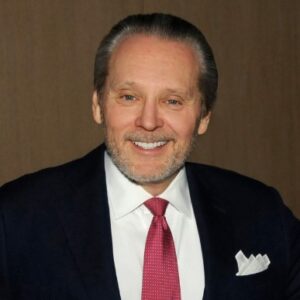
Running the firm with a Servant Leadership management style, focusing on empowering everyone on the team, intensely training them and building their self-esteem, led to this overwhelmingly dominant platform. The firm was sold to Cushman & Wakefield in 2014 for $100 million.
The Massey Knakal Legacy is illustrated by the fact that today in the New York City investment sales market, there are 29 companies, or divisions of companies, that are either owned by, or run by, folks who learned the business at Massey Knakal. Bob is a prominent thought leader in the commercial real estate business, frequently writing about the market, lecturing on the market and appearing on podcasts and national television shows on networks like Fox, CNBC and MSNBC.
Recently, Bob started BKREA, an investment sales and capital markets brokerage firm in New York City which will blend best-in-class analog data sets with artificial intelligence technologies to create a new brokerage firm for a new era.
From Broker To Legend: Bob Knakal’s Rise And Market Predictions For NYC
Our fascinating guest, who is a broker, which is obviously near and dear to my heart and a little bit near and dear to your heart as well, as you’re both real estate brokers. Everybody who’s reading the show, I’m sure, either you know somebody who’s a real estate agent, or maybe you’re friends with somebody who’s a real estate agent. They’re part of your family. Maybe you were a real estate agent.
There are lots of part-time real estate agents.
The fascinating thing about the world of being a broker is really only 1% of people have success in this world. It’s so competitive, particularly, especially actually even in smaller cities. I started my real estate career when I was 22 years old in a very small town. Everybody knew, liked, and trusted me. I was able to fast-track myself on my way to success, but it just goes back to the story I always tell, that was me chasing bigger opportunities in bigger cities. I left the small city and went to the big city, Vancouver. I couldn’t wait.
I couldn’t wait to sell real estate that was triple or quadruple the price that I was selling back home.
Talking about big cities, there isn’t a bigger city than New York, the Big Apple. That’s a dream. If you make it in New York, you really make it anywhere. Our guest is, in my opinion, the top broker in New York, and not just a broker, we’re talking about a commercial broker.
Commercial real estate broker.
We’re talking about selling buildings, and we’re talking about billions of dollars. It’s so exciting about that.
Absolutely. I’m really excited to get into things. I’m going to go ahead, you guys. I’m going to introduce our guest, Bob Knakal. Bob has been a broker in New York City since 1984, having brokered the sale of over 22,339 buildings valued at around $22 billion. He co-owned and ran Massey Knakal Realty Services for 26 years, leading it to sell more than three times the properties of any competitor in New York City from 2001 to 2014. Bob’s leadership style, focusing on empowering his team, was a key to the success.
After selling the firm to Cushman and Wakefield for $100 million, Bob’s legacy remains, with 29 companies in New York City investment sales run by those trained at Massey Knakal. He’s launched BKREA, a cutting-edge brokerage firm blending traditional real estate data with AI technology for the future of the industry. Welcome to the show, Bob. We’re really excited to have you.
Thank you so much for having me. I’m so looking forward to chatting with you.
Career Journey
Bob, please tell us about your background. When you started in real estate, were you thinking of becoming one of the top brokers in the world, or were you just trying to make a paycheck?
Ava, actually, at the beginning, I didn’t even want to get into real estate. I’ll tell you, it’s so funny how the world works and how I feel serendipity has played a great role in my life. I’ll take you back to 1981. I was a freshman at the Wharton School at the University of Pennsylvania and wanted to be the next Gordon Gekko, like every other Wharton kid. I thought it would look good to get a summer job that would look good on my resume, working at an investment bank or commercial bank. I drove around Northern New Jersey, I grew up in a small town, Maywood, New Jersey, and I drove around Bergen County, dropping my resume off at every commercial bank and investment bank I saw, hoping to get a nice summer job. I came out of a Payne Webber office, and across the hall, I saw Coldwell Banker.
I said, “Great, another bank.” I went in, dropped my resume off, and they called me later that day and set up an interview for the following day. This was 1981, so there was no internet to look at. I went to the library the next morning. When I saw that Coldwell Banker was a real estate company, I almost didn’t go on the interview. They were the only ones hiring college kids for the summer. I took the job, loved it, went back my next two summers, and then started with CB in Manhattan when I got out of college in 1984. I just really fell in love with the business right from day one. That first office that I worked in at CB was full of a lot of young, energetic, hardworking people.
Seemed like they were having fun, they were happy, and they were making money. I’m like, “This is pretty cool.” I spent my first summer driving around, looking at commercial properties, logging everything into a database. It just was something that really resonated with me. I was very passionate about it. I feel very blessed that I’ve been doing this for over 40 years. I tell everybody it’s not only my job, but it’s also my hobby. I found something that I truly love and couldn’t even imagine doing anything else.
That brings us to over $22 billion in sales. Put that into perspective for us, Bob, because the word billion gets thrown around a lot. Put something into perspective. What is the average commercial broker doing in sales per year? Give us an idea.
I don’t know. We have a lot of big buildings in New York. The dollar volume builds up pretty quickly, especially if you’ve been around for a long time. I think the statistic that I enjoy more than that is the 2,341 properties that I’ve sold in New York. That’s a pretty good clip. That’s about a building a week and $10 million a week in sales. Those are numbers that I’m proud of. I always say you’re only as good as your next transaction. You have to focus on the next one and not think too much about the ones you’ve finished already.
You are only as good as your next transaction. Keep focused on the next one and not think too much about the ones you have already finished. Share on XBuilding a week, not a moment.
Marketing
I want to just get right into things and start talking about marketing because marketing back in the day was either intimate, it was face-to-face, it was shaking hands, or it was conventional, paying somebody money to get your face in a newsletter or magazine. The world has really changed. You’ve got Facebook ads, Instagram, Twitter X, and all kinds of different things, including YouTube. You can really never turn off the marketing machine. To be noticed, you need to be always at the forefront of technology. Just watching you, and really, really watching a lot of your podcasts, all the time here, if success leaves clues, you are really the poster child of evolution because you have evolved with marketing with a marketing strategy that exists with different brokers at different times. Is this really what sets you apart, Bob, from others? Was it because you were willing to change with the times?
Ava, I don’t know. Thank you. What you just said is very flattering. I will tell you that. I think as much as the world has changed, a lot of it has stayed the same. Many years ago, when I started, you wanted to make people aware of your existence in the market, make them know you and think of you, be top of mind with them, and demonstrate that you can help them when they need to transact. That is a fundamental thing that remains the same. Our strategies and tactics to establish those things have changed over time.
Some of them remain the same. Some of them are very simple prospecting calls, which still is my number one goal every week, to speak to 100 property owners every week, get around to ask them if there’s anything they want to sell. You have to send your email blasts out and send your text messages. I still send hard mail, which I think is very underrated but has a lot of shelf life. You have to do your networking, create content, be on social media, and speak at real estate events and things like that to become known.
One of the catchphrases I always use is that in real estate, it’s not who you know. It’s who knows you. For instance, there are 175,000 investment properties in New York City. There are 250,000 people who are owners of those 175,000 buildings. I make a lot of calls, but I can’t call 250,000 people. It’s important that people know you.
It’s not only those conventional stuff, Bob. It’s also the fact that when Twitter, X comes out, you get on there, and you become one of the top guys on retweet. How do you achieve that? The energy, the drive, the enthusiasm?
August, I think if anything is worth doing, it’s worth doing well. I’ve never played for second place. I always wanted to do really well at whatever I did. I think I’m probably the least technologically savvy person that exists. I realize that technology is very, very important. I’ll take you back many years ago, when I started in the business, I had no cell phone, no fax machine, no computer on my desk. We carried rolls of quarters around to go to the phone booth on the corner of the street to make calls to people. The world has changed dramatically.
I think the extent to which the world has changed over the years is going to get blown away by how it’s going to change over the next five. I’ve been very aware that I have to get up to speed on technology. I’m also a very big fan of a great writer, Dr. Benjamin Hardy, who has a series of books with Dan Sullivan. One of them is Who Not How: The Formula to Achieve Bigger Goals Through Accelerating Teamwork. The thesis of that book is, when you say, “That’s a good idea. How am I going to do that?” You’re asking the wrong question. It’s, “That’s a great idea.”
Who am I going to get to do that for me? When I started my new company six months ago, I knew I had to adapt to new technologies. I had to get up the curve on utilizing AI. I hired a COO from the tech world. He’s an expert at AI. He’s started tech companies. He worked in driverless cars for five years. I figured if he could make a car drive itself, he could help me sell some buildings.
We’re constantly looking to adapt to a changing environment, always sticking true to our core values but adapt with changing strategies and tactics. I think, if anything, I’m very mindful that it’s important to really stay at the forefront of change. People are surprised to hear that I have a broker coach. I’ve worked with Rod Santomassimo at the Mossimo Group for thirteen years. People say to me, “Bob, why do you do that? You have a great track record. You sell a lot of buildings. You have great clients.”
I say, “You know why? Because I don’t know everything. Maybe there’s some kid in Topeka, Kansas, that’s going to come up with a better way to do something. If I’m working with a coach who’s coaching brokers all over North America, the probability that I find out what that kid in Topeka is doing before somebody else does is pretty high.” I always want to try to stay ahead of the curve a little bit and make sure we’re doing everything as effectively and efficiently as possible because, ultimately, that’s in the best interest of your clients. You’re going to get a better execution for your client and a better outcome for your client. At the end of the day, that’s why we’re here, to get better results for our clients.
Bob, unfortunately, pride gets in the way of a lot of people. It gets in the way of their success at times. People think that they’re the best at what they do. They take their foot off the gas when it comes to marketing. I’m obviously talking about the unconventional marketing. In your case, as you just mentioned, you’re pretty much on every podcast we could find. He’s everywhere.
It’s hunger for continued growth and success after 40 years of being in the business that’s so motivational. We always say, like, I think it’s an average of 42 episodes that a podcast really lasts.
People just miss that consistency, and that’s people.
Exactly. They just don’t have the resilience. It’s so nice to hear where your drive comes from, Bob.
If I think one of the things that strikes me is that the brokerage business affords people many opportunities to win just in the lifecycle of one transaction. I laugh when they talk about kids on cell phones. I have a fifteen-year-old daughter, and she’s always on her cell phone. They say that the kids are on it all the time because they get this dopamine rush from the positive feedback they get from different things that they see online. I think, in the same way, brokerage gives me that dopamine rush. I have a client call up and say, “I’m thinking about selling my building,” I get that rush.
You’re going in to give the pitch, and you get pumped up, and you go in, and they say, “That was a great pitch, we’re going to hire you,” you get pumped up. You’re marketing the building, and you reach an agreement on the terms and conditions of the sale, you get pumped up. You sign the contract, you get pumped up. You close the deal, you get pumped up. I think you get addicted to this winning aspect that comes in the lifecycle of a transaction. If you’re doing 30 to 40 transactions at once, that’s a lot of dopamine that’s flying around. It’s a really great business. I really love it.
Drive
Bob, where does your drive come from? What’s the foundation? What’s your why? Gosh, you sold your company to Cushman and Wakefield for $100 million. Most people would be playing golf, showing up to the office every day, especially post-COVID era.
I think some of it probably comes from insecurity. Some of it comes from wanting to succeed. Some of it comes from the way you grew up. I grew up very modestly. I once took my wife and daughter out to look at the house I grew up in Maywood. It’s about a 1,000-square-foot, two-bedroom house with one bathroom, and I grew up with everything I could have wanted. I remember I had five permanent fresh shirts when I started in the business. Every Saturday, I’d put them in the washing machine, get them out, and hang them on hangers on a clothesline in my parents’ basement.
I remember we were selling a townhouse for this guy named Richard Plan. I can’t believe I remember his name. It’s 1984 and I just started in the business. We’re selling a townhouse and go into this guy’s closet. He must have had 150 shirts. Thirty of them were still in the wrapper from the store. He hadn’t even opened them yet. I thought that was the coolest thing I ever saw. I said, “Someday, I’m going to have more shirts.” I think there’s something in me that always made me want to succeed. I think that that hasn’t gone away.
Abundance Mentality
In our research, Bob, there was some data you provided that in Manhattan, South of 96th Street, there are around 27,500 buildings. I’m guessing the average turnover for these buildings is 2.6% per annum. That works out to be 75 buildings per year that are being traded in Manhattan. What is your market?
Actually, you’re very close. Very good. It’s 27,649. The average turnover is 2.6%. That’s about 719 sales per year. A lot of activity. That’s just Manhattan south of 96th Street. If you look at the average year in New York City, where the average is 2.6% in Manhattan and the outer boroughs, we don’t cover Staten Island.
No disrespect to Staten Island, but that market functions more like New Jersey than New York. In Brooklyn, Queens, and the Bronx, there are an additional 120,000 to 130,000 buildings. The average turnover in the outer boroughs is 2.2% annually. There are about 3,600 transactions in New York in the average year. It’s a lot of activity. There’s certainly enough to go around for everybody. That’s an interesting point, too. I think that there are two main philosophies that I’ve seen people have. The first philosophy is that sales is a zero-sum game.
A win for you means a loss for me. I don’t ever want you to win. The other philosophy is an abundance mentality, where you say, “Hey, you just won that one. Good for you. I’m going to go get mine. There’s plenty to go around for everybody.” I think the folks who have that abundance mentality generally are a lot happier. In most markets, there really is enough to go around for everybody. Certainly, in New York, that’s the case.

Commercial Broker: Those who have an abundance mentality in real estate are generally happier, and in most markets, there is really enough to go around for everybody.
That’s incredible, that abundance mentality. When I first met August, he had that abundance mentality. He really taught me that abundance mentality, but it’s really driven us too.
You don’t want to give up the farm, either.
You don’t want to give up.
Tell everybody about your success secrets.
I’ll follow up on that, too, because that brings up an interesting point. I’ve never been afraid to share openly about what I do and how I do it. In fact, my coach, Rod, wrote a book called Knowing Isn’t Doing. I write a periodic column for the Commercial Observer, a real estate newspaper in New York. Once or twice a year, I would write something about the traits that I see in top brokers or tips for brokers to do better. Occasionally, I invariably get 2 or 3 people who come to me and say, “Bob, why do you write that? You’re giving your competition all these tips.” I always say, you know what, there’s a big difference between knowing what to do and actually doing it. Unfortunately, most people just don’t do it. They don’t follow through. I think actually doing things is one of the keys. If you think you have a good idea or you want to try something new, you have to actually do it.
Conventional Data Sources
Let’s switch the conversation a little bit to data. How do you guys collect data? Do you use conventional data sources like CoStar, Yardi, or are you guys more boots on the ground, where you have a team that actually calls the owners to extract information from them?
Yeah, it depends on what segments of the market we’re talking about. We basically go right into New York City records. There’s a system called the ACRIS system. I don’t know what the letters stand for, but we call it ACRIS. You go in and you see the daily transfers, and then anytime a development site sells, I call the buyer and the seller of that site myself and get additional information because usually, there are so many moving parts that you want to know if there were any bonus programs available, were there any adverse environmental conditions, were there any tenants that had to be bought out, all the things that, unless you speak to the buyer and seller, wouldn’t be recorded in the public record.
Most third-party aggregators of information are not able to get that because what’s the incentive for a principal in a transaction to give someone they don’t know and probably can’t benefit from inside information about their transaction? We do a lot of that verification ourselves and get to the heart of what really made that transaction tick. For land sales, I do that calling myself. We have a team of folks that do office-to-resi conversions, multifamily, and retail, but we’re out there gathering that data on a proprietary basis.
Floor Plans
You’re also synonymous with having these floor plans or images in your office all over the walls. Talk to us about that.
The maps, the NACo map room. That was one of my COVID projects. I took the time to walk every block of Manhattan south of 96th Street, looking at buildings that were under construction and potential development sites, highlighting a tax lot map with different colors for different things. I ended up with a map that is 24 feet long and 10 feet wide and has identified on it every single development site under contract or construction, recent sales activity.
We’re coming out with a land index looking at sales going all the way back to 1984, disaggregating them into land sales for residential rental, condo, hotel, office, and a miscellaneous bucket. So much of the real estate business is not really about real estate. I always say our business is the information and relationship business. The better quality your information is, the more of a competitive advantage you have, and you want to use that information to forge very strong relationships with clients who will come back to you time and time again.
Becoming An Investor
Switching the conversation a bit again here, talking about how we’re in the private equity space and the investing, real estate investment space. I want to chat about that a bit. Over the years, I’ve met some incredible real estate brokers, particularly in the commercial space. Some of them are well-educated and well-organized, and God gave them the gift of gab.
Sometimes, I really think I am lucky that they’re not coming into my space or our space. You’ve been in the big game for 40 years. I’m sure this is going to be the case you’ve seen some absolute clowns doing really well in the investing business coming in. Former chiropractors or somebody who had no business being in real estate coming in and actually doing really well, but at times that doesn’t last.
Have you ever wondered, coming onto the dark side over the years, saying these people that are coming in doing so well in investing, especially in the syndication world, starting in 2012 or 2013 when the JOBS Act allowed for people to raise capital from the members of the public? Have you ever thought about that, or have you ever thought about being an investor rather than just being a broker or starting an actual investment firm, private equity firm? Talk to us about that because it seems to be a normal, natural evolution, but I don’t see a lot of brokers becoming investors. Talk to us about that.
Actually, there are a number of investors here in New York who started as office leasing brokers and evolved into developers and investors in office buildings. They have done very well. I’ve never switched over or been tempted to switch over to the ownership side of the business for two reasons. Firstly, in the 26 years and 46 days of running Massey Nickel, every waking moment that I was working, I wanted to work on trying to figure out how to make that company as valuable as possible. I didn’t want to divert my attention away from that objective by looking at buying properties or anything else that would take me away from that.
After selling the firm, I got to be a little bit introspective and think about what I wanted to do in the future. Did I want to buy a property? It occurred to me that it sounds really weird, but I really don’t know that much about it. I think it’s a full-time job to be a property buyer. I also didn’t want to have conflicts of interest with my clients.
If my clients knew that I bought property as well as brokered property, I never wanted to have to answer the question when I offered them one of the buildings I was selling to have them say, “Bob, if this is such a great deal, why didn’t you buy it?” I always try to keep things very, very simple. I don’t like conflicts of interest. I never want to have to remember what I say to anybody. That’s why our value proposition of only selling buildings, only representing sellers, only working on exclusives, only working in New York, keeps our value proposition very clear, not opaque at all. I said that in six seconds. There’s nothing vague about it. Just keeping things simple has been something that’s worked for me.
Hyper-focused on your craft. No bother with distractions.
Shiny object syndrome, which is really good.
Advice For Brokers
Quickly on that, what’s your advice to brokers who are doing well but are seeing how the other side investors are doing? Should they venture into that? What is your advice there to them?
I think it depends on what they really want. What are your objectives? What do you want to achieve? As I said, I know a number of my friends who are brokers, and they buy property and they do very well. They’re very happy. I’m happy for them. It’s just something that hasn’t worked for me. I think you can’t paint the market with a very broad brush.
The same thing doesn’t work for everybody. There may be folks who think, “I really want to buy property.” If I had purchased some property and had good depreciation, maybe things would be different for me. I’m not regretting that. I’m not going back in time. I think everyone has a different risk tolerance. Everybody has different objectives that they want to achieve. For me, it was easier to keep life simple and focus on getting listings and selling buildings and not worrying about other things.
Real Estate Titans
Being in New York, obviously the Big Apple, the city of big shots, I was reading Trump: The Art of the Deal by Donald Trump. He talks about when he built Trump Tower, he’s selling these condos to Japanese and Arabs coming over and what have you. When he got his real estate license, he was going there selling the condos because the brokerage fee was so high.
I always see you on social media, on LinkedIn and Twitter, having dinners with a lot of different kinds of individuals in our space. In your time, have you rubbed shoulders with any famous people, Trumps of the world or on the institutional side, like Blackstone, Stephen Schwarzman of the world, or any heads of state, kind of golf-rich nations coming over? Talk to us about any stories you can share about any kind of the ones that you can.
There are a lot of folks that I view as celebrities that other people may not. Certainly, there are a lot of normal celebrities that are all over the place in New York. You go to a restaurant, and I’ve been to plenty of places where I’ve been having dinner next to Wilbur Ross, Clive Davis, Danny DeVito, or Woody Allen. That just comes with the territory in New York, which is great. To me, the real celebrities are the real estate titans of our industry, like Larry Silverstein, Steve Roth, Steve Ross, and Jeff Blau. You’re going to get me in trouble, obviously, by asking me this question because I’m mentioning people I know, and I’m going to forget people. I’m going to stop naming names because I don’t want to mention too many and leave people out.
How about doing business with any of them? How about selling any properties to any big names around the world? There were Russian oligarchs at some point, or a lot of them coming and buying New York real estate. You’ve got the Chinese, you’ve got Japanese prior to that in the ‘80s and early ‘90s. Any big names you can, or even people within the US, any big names coming in? I’m a big boxing follower, boxing fan. Floyd Mayweather always talks about buying a building in New York. Are there any big names or celebrities you can share that he actually sold any properties to?
I will tell you why Floyd Mayweather bought a building in New York. He did so with a buddy of mine, Jeff Sutton, who’s a huge investor here in New York. Jeff, Floyd was saying that in his last fight, he got $100 million for the fight. Jeff called Floyd a dentist. Floyd said, “A dentist? What are you talking about?” He says, “You only get paid when you work. I’m sitting here with you, enjoying our night out. I’m getting paid right now. I own real estate. I’m going to sit here and my tenants are paying me rent.”
I think that Jeff was the one actually who convinced Floyd to get into the real estate business. Lots of interesting folks. We always are dealing with people from all over the globe. I think at last count, I had sold properties to investors from 47 different countries. It is always somebody coming into New York thinking they want a piece of the Big Apple. A lot of these folks are really very, very prominent in their own industries, if they’re not real estate people. A lot of interesting folks we rub shoulders with here in New York.
I guess you can’t share any big names.
Not at all.
A lot of this is confidential.
I try to extract it but that’s totally fine.
Juicy Deal Stories
Speaking about doing business with brokers, Bob, we have a good friend of ours. His name is Beau Beery. He actually wrote a book on how to be an elite real estate investor. His book is called Multifamily Investors Who Dominate: An Inside Look At How Elite Investors Transact. He teaches this concept where brokers have a black book, where they keep score of the type of clients they have, the type of investors that they’re working with, the people that come through. Really, when you burn bridges, your name goes, and it can go very bad in the industry. Brokers are going to be reluctant to work with you. Do you have any juicy stories on deals where something either went wrong, or a buyer maybe retraded, maybe in the great financial crisis, the GFC, or the COVID era where there was like this chaotic ensued?
Yeah, that happens all the time, particularly in markets. The retrade happens. That’s another reason why I like representing sellers because I’m always fighting to get the buyers to toe the line and not do the retrade. The best way to make that happen is to be very transparent about everything. When we put our marketing materials together, we obviously show all the good and compelling things about the property.
We also show all the warts because we don’t want something to come up at the last minute and have the buyer say, “I wasn’t aware of that. I have to adjust my price accordingly.” There are many different tactics and strategies that we’ve implemented to give leverage to our clients, who are the sellers, and not let buyers do that to the extent we can prevent it. I just want to share one story with you.
We had a big development site that we were selling in the Nomad area. The contract price was about $90 million. The buyer had put up a $9 million deposit but wanted a long closing period. Normally, closing periods here are 60 to 90 days. He wanted a nine-month closing period. Based on the price he was paying, the seller agreed. I think what happened that was at a time when the market had just picked up so significantly. Everybody was really, really busy.
I believe that this buyer was a very big investor in New York, owns dozens of properties. I think he forgot about the closing. He called up the day before the closing and said, “Bob, it was supposed to close tomorrow. Please send me the rent roll again. Send me an updated rent roll.” Sent him the rent roll, the same one that was attached to the contract of sale. He said, “This is the wrong rent roll. The seller’s breached. I want my money back.” Ended up defaulting and losing a $9 million deposit because I think he forgot when the closing period was.
Another funny story, I have one of my best buying clients that I’ve sold a lot of properties to is the hotel developer, Sam Chang. Many years ago, I was selling him, which is going to sound like a very small property, but for New York, it’s not so small, but a little 50 by 100-foot development site where he was going to build a hotel over on West 33rd Street. I forgot the address; I’m making it up, but let’s just say it was 325 West 33rd. It just so happened that 335 West 35th Street was the same exact 50 by 100-foot parking lot. It had two parking lots, the same size, and the same numbered address; there was just one on 33rd Street and one on 35th Street.
Sam signs the contract the day before the closing, calls me, and says, “Bob, is that property I’m buying on 35th Street or 33rd Street?” I said, “Sam, it’s on 33rd Street.” He’s like, “I thought I was buying on 35th Street.” Sam, being the guy he is, closed on the building anyway, even though he thought he was buying a different property. Sometimes things happen, and there’s always something, an interesting story, for every transaction.
Black Book
Going back to Ava’s question, though, is it true that the top brokers keep records of buyers who don’t deliver, who retrade, who make the life of their broker miserable? Does that go around the fraternity and get passed around that, “Hey, don’t deal with this guy because he will make your life a living hell?” Is that true?
Without a doubt. We’re always dealing with people who we don’t know. If Mr. or Mrs. X comes in on one of our buildings and is interested and makes a bid, and we don’t know them, we’ll first call our colleagues at other firms and say, “Have you ever worked with this person? What can you tell me about them?” The worst thing you could do to a broker is retrade and try to jerk around and not do what you say. That will absolutely get around. Reputation is so important in our business. You can work a lifetime to make a great reputation, and one or two slip-ups can really hurt.
It’s really important to do the right thing. Sometimes, there are very legitimate reasons why someone can’t fulfill what they said they were going to do. I think it’s the way that you explain it, the rationale for it, returning the call, taking the call, making the explanation. I think the way you handle it says a lot about how your actions will be interpreted by the people you want to work with.
Absolutely. We take this very seriously at CPI Capital. Our last deal that we closed on, we showed the brokers, “Hey, we can close on time, as we promised. We can raise the capital, the $10.5 million of equity that was needed,” and it really cemented that relationship for us. Brokers talk, so I tell everybody, we’re very, very serious about the relationships that we have with our brokers.
If you don’t treat brokers right, you become the buyer of last resort. You don’t want to be the buyer of last resort. You want to be the first call, not the last call.
If you do not treat brokers right, you become the buyer of last resort. Share on XGreatest Real Estate Deal
You said it’s all about relationships, too. Bob, given that I love stories so much, I was going to ask you, can you give us the greatest rags-to-riches story that you have ever seen in your 40 years? If you can, tell us about the riches-to-rags story when maybe an institution or someone you know possibly lost it all.
I’m happy to tell you that I don’t know if it’s a true rags-to-riches story, but I will tell you what I think is the greatest real estate deal that I’ve seen in my career. There was a factoring company in the garment center that would routinely make loans to companies that were active in the garment business in New York. They would take all kinds of things as collateral, inventory of garments, a painting somebody had on the wall. The offices these folks had were unbelievable, like museum-quality artwork all over that were collateral for loans they ended up taking back.
In the 1980s, this firm made a $4 million loan on a parking lot over in the Hudson Yards area. This was at a time when Hudson Yards was not what Hudson Yards is. It was a lot of industrial-type buildings, a lot of not-so-legal things going on. After 3:00 in the afternoon in this neighborhood, if you were in that neighborhood after 3:00 PM, you were trying to get in trouble somehow. There’s a huge parking lot over on 34th Street.
Interest Rate Policy
Rosenthal & Rosenthal made a $4 million mortgage on that property and ended up foreclosing on it and took it back. Years ago, they hired me to sell that parking lot for them. We sold it for $238 million. They went from making a $4 million loan to selling it for $238 million. That was a fantastic transaction. In terms of the riches-to-rags story, I certainly wouldn’t give any specific names. I will tell you that we have a lot of folks that, unfortunately, are seeing a lot of their net worth wiped out by virtue of the interest rate policy that our Federal Reserve Bank has implemented. It is really tragic what has happened.
I think it’s a statement that public policy here is highly correlated to how markets function. Our multifamily sector has a rent regulation system that essentially creates a disincentive to invest in the housing stock. It’s implemented to protect tenants, but it hurts the tenants because the quality of the housing stock is deteriorating. There’s no incentive to build new housing. The supply is constrained.
Every politician says they want rents to be more affordable for everybody. Yet every single housing policy that’s been implemented or ignored since 2018 in New York has done nothing but constrict supply and exert upward pressure on rents, making New York less affordable for everybody. I think what we’ve seen with the interest policy is that a lot of folks have mortgages at 3.5%, and if you want to refinance, you have to pay the mortgage down by 25% to 35%.
Your rate is going to be double what you were paying. Even with that 25% or 35% pay down of the mortgage, your mortgage payment’s going up significantly. That is really causing a lot of stress for a lot of folks. It’s really heartbreaking to see that so much equity has been eroded based on this interest rate policy that didn’t really have to be.
New York Housing
Touching back on rent control, New York has historically always set the precedent when it comes to large urban cities around the world. When it comes to rent control, I don’t know the exact details. You can rent, there’s also a kind of government initiatives or government-owned buildings within New York. You pay like $2,000 a month rent, but the actual rent for that unit is like $10,000. I wanted to get your thesis. Vancouver, where we live part-time, is also dealing with that. We have the downtown East side, a part of Vancouver, where it’s right in the downtown and is full of people that are drug users, people that have mental health issues.
The streets look like a war zone. There are tents and people using drugs on the streets. New York had similar issues. Rudy Giuliani came in, cleaned that up, and a lot of different measures were put in, but they seem to go hand in hand, poverty, drug use, mental health, housing, they seem to go hand in hand.
Every time the government steps in, the housing projects are another issue the US has had. You touched on it a bit there, but give us your thesis on that. When it comes to New York, I see a post you did on Twitter, as well as educating the policymakers. Give us your thesis. If somebody here in government, in City Hall, hears this at the municipal level across Canada or other places around the world, what advice do you have for policymakers?
Here’s what I say. I think it’s very simple. I’ve had this conversation with the mayor of New York and with the governor of New York. The solution to all of New York’s housing problems can be solved very simply with more supply. When I say that, we have policymakers here that truly believe that economics doesn’t work. Even if you believe that an econ 101 textbook is capitalist propaganda, you don’t have to look any further than the pandemic.
During the pandemic, in 2020, people left the city in droves, so many apartments were vacant, and all of that vacancy was effectively an addition to the supply of apartments. What happened? Rents dropped by 30% in Manhattan. There is no housing policy that has been implemented anywhere in the United States that has made rents go down 10%. You had a 30% drop in rents because of the addition to supply.
Why aren’t you, as a policymaker, doing everything you possibly can to incentivize the creation of new housing? What our policymakers have done, unfortunately, is they think they’re protecting tenants, and that leads to more votes. It’s a fallacy to think that you are going to create new housing at very, very low affordability levels, and it’s still going to make sense to build that building. You have to strike the right balance.
It is a fallacy to think that you can create new housing at a very low affordability level while still making sense to build them. You have to strike the right balance. Share on XWe had a program that worked very effectively for a long, long time called the 421-a tax abatement program. That lapsed, it came back, and the new program, called Affordable New York, that wasn’t quite as good as 421-a, but was a little better. We have the next iteration of that policy, which is called 485-x. It is a housing program that has with it because our policymakers need to appease union workers, and minimum wages just don’t make any sense. You implemented a policy that’s going to show very, very little in the way of new construction, and that’s not what we need.
I’ll give you the most glaring example of this. I’ll take you all the way back to 1978. David, you like stories, so you’ll like this story. In 1978, the Yankees and the Dodgers were playing in the World Series, and Reggie Jackson was famously hitting all those home runs, four home runs in a row, and the Goodyear blimp was over Yankee Stadium.
It pans out, and there are 6 fires going on within 3 blocks of Yankee Stadium. Why were those fires going on? They were going on because, in those days, it made more sense to burn your building down and collect the insurance money than to invest in the building. The city very wisely created two programs to incentivize the private sector to invest in housing. One was called the Major Capital Improvement Program, where you got benefits and the ability to raise rents if you did things that helped the whole building, put in a new boiler, put in a new roof, renovated the lobby, renovated the staircase, put in new windows in the whole building, things that upgraded living conditions for people.
The second program was called the Individual Apartment Improvement Program, where you also would do renovations to the apartment, and you were able to pass along the cost of that in higher rents to the tenants. You would put in new flooring, kitchens, bathrooms, sheetrock, and lighting. Better living conditions, and you were able to raise rents on apartments.
In 1978, the dilapidation rate in New York was 14%, meaning that 14% of the housing units were deemed uninhabitable because of their condition. 2019 the dilapidation rate was 0.04% because these two programs incentivized the private sector to dump tens of billions of dollars into the housing stock. In 2019, our policymakers marginalized both of those programs. When an apartment that was renting for $700 a month, in the old days, you’d do a complete gut renovation of that apartment and put it back on the market at $4,000 a month. Now, you are unable to do that. What happens when the tenant leaves the $ 700-a-month apartment? The landlord nails the door shut.
We have tens of thousands of these and some estimate 60,000 to 80,000 apartments that are nailed shut. What is it doing? It’s constricting supply. It’s exerting upward pressure on rents. Tenants have less choice. It doesn’t make economic sense to do this. All you have to do is reinstate these two programs that work so beautifully. Think about how economically stimulative that would be.
You’d have 60,000 to 80,000 units under gut renovation within two weeks. How many toilets are you going to sell? How many sinks? How much sheetrock? How much flooring? It would be billions of dollars in economic stimulus to do this, but we need more supply. My message whenever I talk to an elected official is that we need more apartments. If you have more apartments, it’s going to be more affordable for everybody.
State Of Real Estate
Last question before we get to the next segment of our show. We want you to give us your opinion on this. Real estate is such a broad ecosystem. You have a lot of different markets within real estate. Office space is currently not doing well, just because of the post-COVID era and what have you. A lot of those office units are not really usable for office people working in cubicles. Looking at it overall, if you want to look at commercial real estate, that’s fine. If the real estate cycle was a clock, 12:00 being on top of the market and 6:00 being the bottom of the market, where does Bob Knakal believe we are now? What time?
I think we are at the beginning of a correction. I would say we are going from 6:00 up towards 12:00, but we’re probably only at 7:00 or 8:00. It’s definitely looking brighter. One interesting thing about this correction that’s very different from past corrections that I’ve lived through is that different product sectors are performing differently. Our retail market is doing very well, but it started to be negatively impacted years before anything else. Our hotel market has very strong fundamentals. Our industrial market is strong. Our multifamily market is hurting. We have a policy that’s going against the industry.
We have interest rates that have gone against the industry. Our Class A new construction office sector is doing pretty well, good demand, high rents. Our BNC office sector is facing challenges. That is probably going to be disaggregated into three buckets. A bucket of buildings that will be upgraded and stay office buildings, a group that will be converted to residential, and then a third group that is simply going to be demolished. I think that we’re heading into a time where, because we have these different sectors moving in different directions, in 2025, we are going to have a very robust group of discretionary sellers who are going to sell because, as you said earlier, the average turnover rate in New York has been 2.6%. We’ve been below trend for seven years in a row. There is pent-up demand to sell in the system.
People are going to take advantage of those sectors that are doing well with prices going up a little bit and sell. We will see robust discretionary selling, while at the same time robust non-discretionary selling, where people can’t afford to refinance. They don’t have the cash to put in to refinance. If they have the cash, they’re going to choose not to pump it into a building. They’ll be forced to sell. We’ve never had this confluence of those two things. Normally, in good times, there’s a ton of discretionary sellers. In bad times, there’s a ton of non-discretionary sellers. The market is moving in different ways, so we’re going to have discretionary and non-discretionary sellers very active at the same time.
The highest turnover that we’ve ever seen was in 2012, when turnover was 4.3% of the stock. That was catalyzed by a capital gains tax increase that was buried in our healthcare law that was going to kick in in 2013, which forced a lot of people to sell in 2012. 4.3% has been the previous high over the last 40 years. I think we’re going to see turnover next year in New York over 5%. I already feel it. It’s starting to bubble. It’s happening, and by bubble, it’s starting to become tangible. We’re getting many more offers every day on the properties that we’re selling. I think 2025, from a transactional volume point of view, is going to be off-the-charts great.
Ten Rounds To Financial Freedom
Thank you so much for your advice and wisdom. We’re going to get into the next segment of our show.
I’m excited for this segment with Bob. It’s called the Ten Championship Rounds to Financial Freedom. Bob, are you ready for the questions?
I’m ready, Ava. Let’s go.
Here we go. First question, who’s been the most influential person in your life?
I have to say probably my mom. My mom, unfortunately, passed away in 1983. She taught me a lot of my values. I was always there when I needed her. I’d definitely say my mom.
Next question, what is the number one book you’d recommend?
There are so many. First, go to BobKnakal.com. I actually have a suggested reading list on there. Dan Sullivan and Ben Hardy’s series of books are great. Who Not How: The Formula to Achieve Bigger Goals Through Accelerating Teamwork, 10x Is Easier than 2x: How World-Class Entrepreneurs Achieve More by Doing Less, The Gap and the Gain: The High Achievers’ Guide to Happiness, Confidence, and Success. Jim Collins’ Good to Great: Why Some Companies Make the Leap… And Others Don’t is fantastic. I love the Harvey MacKay books. The books by Robert Cialdini on Pre-Suasion: A Revolutionary Way to Influence and Persuade I think are great for salespeople.
The Power of a Positive No: Save the Deal, Save the Relationship, and Still Say No by Harvard professor William Ury. The Art of Woo: Using Strategic Persuasion to Sell Your Ideas by one of my Wharton professors, G. Richard Schell. So many great books. I never read alone. Keith Ferrazzi. Great, great stuff out there. Take a look at my list. That is one of the things that I think there should be a curriculum in college.
You take an accounting class and you learn that prepaid rent is, I forget, a debit or a credit on the balance sheet. Who cares? You’re never going to use that. Teach kids about likability, salesmanship, human behavior, and relationship building. Those are the things that will tangibly help people throughout their whole life. Many of these books have all those lessons in them. I love reading that stuff.
Incredible.
I love it. August, there’s like ten Audible. I was like, write down some books that you want. I got 10 or 20 Audible. Thank you, Bob. You just solved a problem that I had. I’m going to look into a lot of those books that you just mentioned. Thank you for that.
My next question is, if you had the opportunity to travel back in time, what advice would you give your younger self?
I think that I would say to become more of an expert at one thing. For most of my career, I’ve been a generalist. I’m focusing much more on development opportunities. I really think that the way you create true value in yourself as a broker is in specializing in one thing and becoming known as the expert in that particular thing. You want that area to be small enough that you can know every single thing about it, but large enough that you can make a good living doing it. There are some downsides to that because then one year multifamily will be hot, and the next year industrial will be hot, and the next year, you’re going to have ebbs and flows. I think if you really want to turn your career and transition from being a deal-to-deal person and a broker that creates an annuity for life, being an expert is the way to create that annuity.
Create true value in yourself as a broker by specializing in one thing and becoming known as the expert there. Share on XAbsolutely love that, Bob. The next question is, what’s the best investment you’ve ever made?
Best investment I ever made was probably buying the highlighters and walking the streets of Manhattan to create my map. It has been by far and away the best marketing tool that I’ve ever created. Over the course of my career, I’ve won 26% of my pitches. I’ve given 25 pitches in the map room, I’ve got 25 exclusives. I know I’m going to lose one of these days, but it has really been the best thing I’ve ever created. I’m proud to see that there are map rooms popping up all over the country because of social media. I think it’s great. For me personally, to have done that was something I’ve wanted to do for years.
My only regret is I wish I had done it 30 years ago. That absolutely was the best investment of time, not necessarily money, but the investment of time,220 hours out in the field walking the streets. The best thing I ever did, by a long shot.
That’s incredible. I love that. Bob, what’s the worst investment you’ve ever made? What lessons did you learn from it?
The worst investment I ever made, because I’ll take you back again to my third summer working at Coldwell Banker. I still was the Wharton guy, still thought Wall Street was a cool thing. I took the salary that I made for all three summers and I bought stock in a company called Braniff Airlines, which ended up going out of business. I lost all the money. I have not bought a share of stock since.
Thanks for sharing that. Next question, Bob, if you can have dinner with someone dead or alive, who would it be?
I think it would be really interesting to have dinner with Babe Ruth. I think in a New York restaurant, I think that would be probably really interesting. I have to say, I think I would really get a kick out of having a few drinks and dinner with Frank Sinatra in Vegas. Those would be two things I think would be pretty cool to do.
Next question. How much would you need in the bank to retire? What’s your number?
There is no number. I will never retire. I don’t think it’s about how much you have. Like I said, I truly, truly love this business, and I get so much enjoyment out of it that I will never retire. I’ve said for many, many years that when they put me in the ground, I’ll have deals under contract, and my wife is going to have to collect those commissions. I’m not retiring anytime soon.
We can definitely see that within you. That’s amazing. Next question, Bob, what would you be doing now if you weren’t doing what you’re doing now?
I’ve been asked that question a few times, and I have to tell you, honestly, I’ve never thought about it. I have no idea. I have done this my whole life. There are other things I enjoy doing, but my life is very simple. I spend time with my wife and daughter, I sell buildings, I go to church, I work out, and that’s it. I’m very happy with the way my life is. I can’t imagine doing anything else. I’ve never really thought about it. I don’t have an answer to that one.
We know you love books and whatnot, but this is my favorite question. Book smarts or street smarts?
Definitely street smart. I was not a good student. I got into the Wharton School. I’m not ashamed to say I got in because my high school baseball coach was the baseball coach at Penn. My grades alone were not good enough to get me in. I think my GPA was probably somewhere between 2.5 at Penn. Good enough to graduate, which I’m very proud of. Proud to say I’m a Wharton alum. Definitely, I am. I’m a street guy. Love, love rolling my sleeves up, getting my fingernails dirty in this business. Most of the folks that I deal with are high-net-worth individuals and families. I think it’s a good combination, but definitely more of the street smart than the book smart.
Last question, Bob. If you had $1 million in cash and you had to make one investment, what would it be?
I would buy. What would I buy? I would buy gold, I think it is a good investment. There’s a lot of craziness going on in the world. I think gold is safe. I’d buy 1 of 2 things if I had to buy real estate. I would buy properties in New York City around major transportation hubs because I think our city planning commission is going to have to continue to increase density around transportation. When they increase density, they increase value. I think that’s a good play or well-located properties in Manhattan. I think Manhattan is super-duper cheap. I think now is the buying opportunity of a lifetime. I think if you believe in the future of New York, now is the time to buy property here. I would probably buy a well-located property in Manhattan.
Thank you so much, Bob.
Episode Wrap-up
Bob, just quickly let everybody know who’s reading what’s the best way that they can reach you, please?
The best way to reach me, you can always email me at BK@BKREA.com or follow me on social media and DM me. I’m on most of the major social media platforms. I’d love to hear your questions and communicate with you. I have to say, guys, thank you so much for having me on. It’s really been a blast. You asked me a lot of questions that I don’t get asked often. I love that.
We really enjoyed the show. Thanks, Bob.


